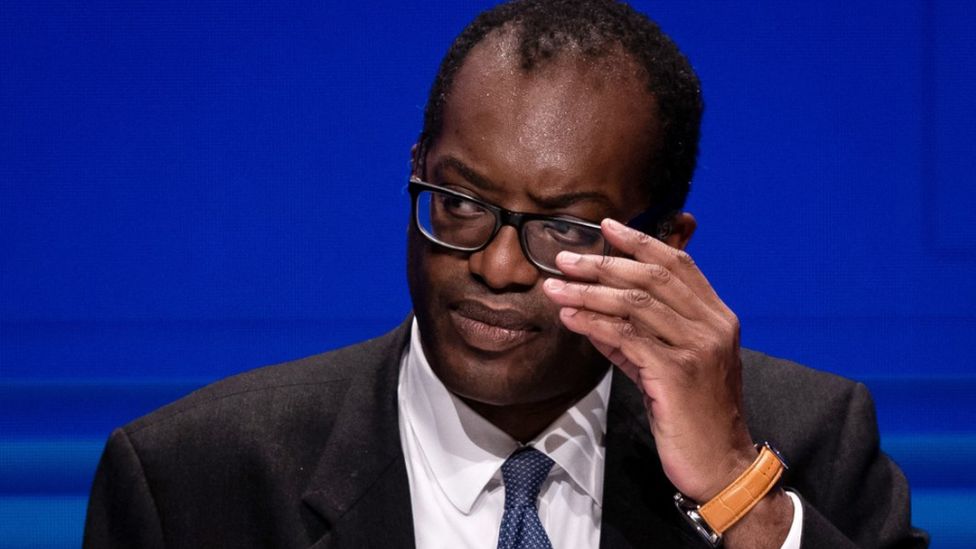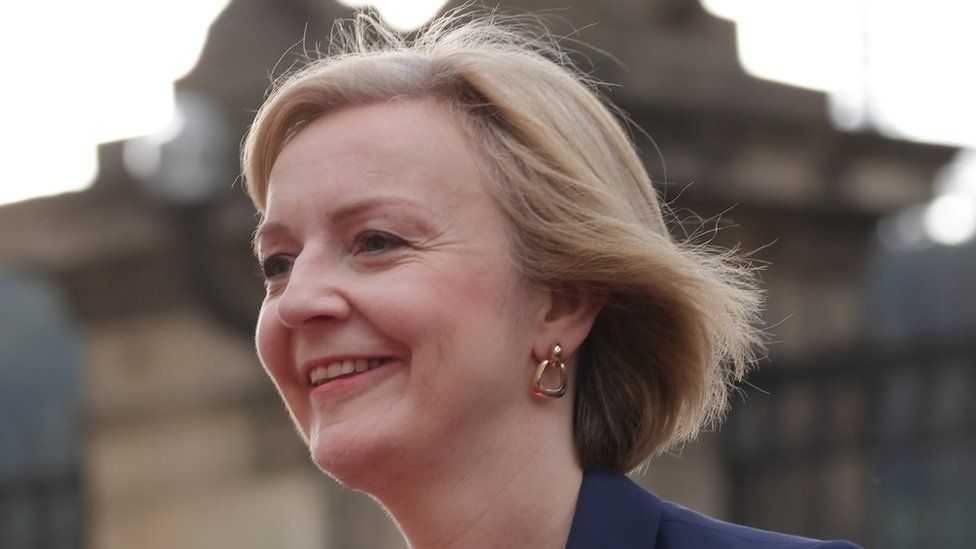Borrowing costs for the government rose, even after the chancellor’s update was brought forward.
 Image source, PA Media
Image source, PA MediaKwasi Kwarteng will bring forward his plan for balancing the government’s finances by almost a month to 31 October, in a bid to reassure markets.
The economic plan will set out how the chancellor will fund tax cuts and cut debt after his mini-budget plans for extra borrowing rattled investors.
An independent forecast of how the economy will perform in coming years will be published at the same time.
Mr Kwarteng had initially said he would wait for 23 November to give details.
His refusal to publish a draft report by the Office for Budget Responsibility (OBR) to accompany the mini-budget on 23 September also rattled markets and some MPs.
In the wake of the mini-budget, the pound slumped to a record low, government borrowing costs surged and the Bank of England was forced to step in and take emergency action after the dramatic market movements put some pension funds at risk of collapse.
The new date means Mr Kwarteng’s fiscal statement will be published before the Bank of England announces its latest decision on interest rates on 3 November.
The Bank’s Monetary Policy Committee (MPC) is widely expected to raise interest rates for the eighth time since last December with many economists forecasting a sharper rise than previous increases.
But Mel Stride, chairman of the Treasury Select Committee, tweeted that he hoped Mr Kwarteng’s decision to release the report earlier would result in a smaller rate rise.
He tweeted: “If this lands well with markets then MPC meeting on 3rd Nov may result in smaller rise in interest rates. Critical to millions of mortgage holders.”
Former Transport Secretary Grant Shapps, who supported Rishi Sunak in the Tory leadership contest, called Mr Kwarteng’s decision “a belated but sensible move”.
Noting that that the plan will be published on Hallowe’en, Labour deputy leader Angela Rayner tweeted: “Trick or cheat? The Tory horror show rattles on.”
The OBR, the independent budget watchdog, will now publish a report alongside Mr Kwarteng’s statement at the end of October. Its forecasts will give an indication of the health of the nation’s finances.

Analysis
By Dharshini David, BBC economics correspondent
The chancellor bringing forward his explanation of how he intends to get down government debt and the official watchdog’s assessment of his plans to Hallowe’en is aimed at quelling the market turmoil which has driven up borrowing costs for households and government.
Providing reassurance on that score will likely mean confirming unpalatable news for others. For most economists reckon that, even if the government can boost growth, it will realistically need to find savings of perhaps £40bn or more, if it is to bring down debt in a few years.
But by anyone’s measure that’s not small change, it’s an amount greater than the defence budget, and won’t be raised through efficiency savings. Many public services are already hampered by pandemic disruption and rising inflation. The Institute for Fiscal Studies reckons the latter means departments have to find £18bn from existing budgets just to provide planned services.
On top of that balancing act, they’ll be bracing for a new wave of austerity.
Borrowers have faced paying the price for the markets’ lack of faith in the government’s plans – millions more may feel the cost of regaining it.

There was confusion last week after government sources briefed journalists that Mr Kwarteng would bring forward his fiscal statement to October, only for the chancellor and prime minister to contradict this a day later.
Quizzed on Tuesday by GB News, the chancellor said there had been no change. “People have been reading the runes and the pauses, it’s going to be the 23rd,” he said.
However, Treasury sources then clarified that the chancellor would, indeed, bring the statement forward and that it had simply been waiting to officially announce the change of date in Parliament.
Since then the government has been forced into a series of embarrassing climbdowns under growing pressure from its own MPs.
Last week, Mr Kwarteng scrapped a decision to cut the top rate of income tax.

Image source, Getty Images
And on Monday, James Bowler was announced as the new permanent secretary to the Treasury. There had been speculation that Antonia Romeo, permanent secretary of the Ministry of Justice, would take on the role.
Ms Truss fired Sir Tom Scholar, the civil servant who previously held the job and planned to bring in a high profile outsider – a move some feared would further spook the markets.
Ms Truss still faces a potential rebellion from her MPs after declining to say whether she would increase benefits in line with inflation next April.
Her approval ratings have plummeted since the mini budget. The prime minister says her tax cuts will boost the UK economy after years of lacklustre growth.
But there are fears the government will have borrow huge sums to fund this. The cost of government borrowing consequently jumped, as investors demanded higher rates of interest on UK government bonds.
It has fed through to the mortgage market where hundreds of products were pulled due to concerns about how to price these long-term loans.
Last week, interest rates on typical two- and five-year fixed rate mortgages topped 6% for the first time in over a decade.
‘Clearly nervous’
On Monday, the Bank of England announced measures to ensure an “orderly end” to an emergency bond buying scheme it was forced to launch after Mr Kwarteng pledged additional tax cuts on top of those outlined in the mini-budget.
Susannah Streeter, senior investment and markets analyst at Hargreaves Lansdown, said that the government and the Bank had launched “a two pronged attempt to calm markets” as the pound remained weak and government borrowing costs inched up again.
“Policymakers and politicians are clearly nervous about seeing a repeat of the mini-financial crisis unleashed following the presentation of the Truss administration’s slash and spend plans and fresh moves are being made to try and repair the damage,” she said.
“All eyes will be on the independent assessment of his spending plans, and the risk is that if the numbers don’t add up, the markets could take fright again.”